Health
COVID-19: Handwashing Adherence Drops by 93% in Kampala Hotspots
Published
5 years agoon
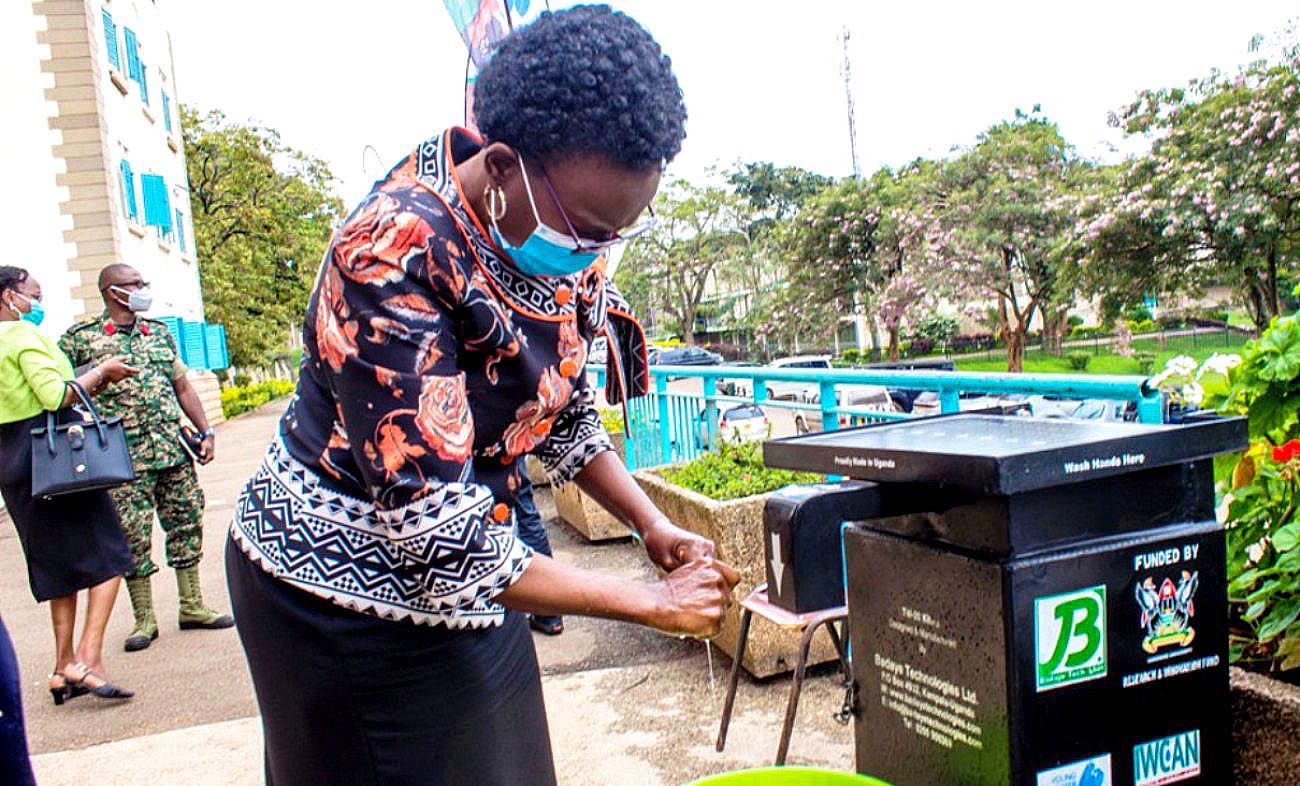
By Joseph Odoi
As Uganda continues to fight tirelessly to control the spread of COVID-19, results from a field-based survey in Kampala’s informal settlements have indicated that citizens have abandoned hand hygiene, a key pillar in stopping the spread of a virus.
To beat the virus today and ensure better health outcomes beyond the pandemic, hand hygiene, especially through handwashing with soap have been emphasized as a top priority.
But results of a study titled: Adherence, Lived Experiences and Resilient Transformation among “slum dwellers” (ALERTs) in COVID-19: A study of Ki-Mombasa and Kabalagala-Kataba slums in Kampala present an urgent need to intervene in these communities in order to improve public hygiene practices such as handwashing, if the intended objectives are to be achieved.
Dr. Gloria Seruwagi, a behavioural scientist at Makerere University School of Public Health has observed that some of the set Standard Operating Procedures such as physical distancing, regular sanitizing and use of face masks are less likely to be followed and implemented due to congestion in the settlements.
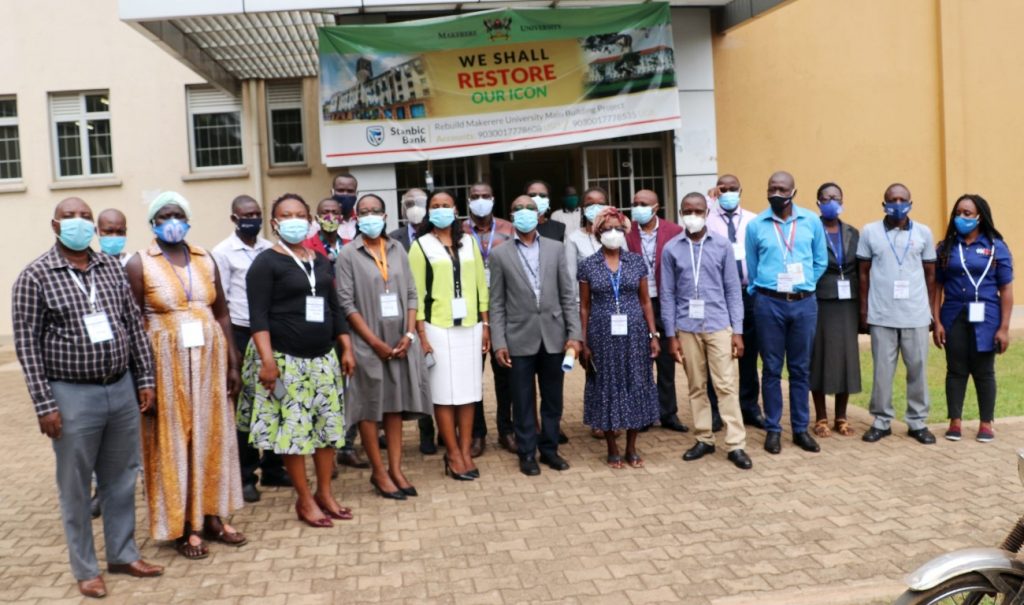
While presenting an overview of results from the study, Dr. Seruwagi said Ugandans had gone back to their old ways and abandoned best hygiene practices such as handwashing, which is critical in the fight against COVID-19.
“Residents say they can’t afford masks and those who have them say masks make breathing uncomfortable. Sanitizing is a luxury to most people in Bwaise and Kataba communities. While the practice of handwashing was feasible and adhered to at the beginning of March, it has drastically dropped by up to 92.6%.
Dr. Seruwagi, who is also the Study Principal Investigator observed that residents of Ki-Mombasa and Kabalagala-Kataba still have a major infodemic challenge of misinformation surrounding COVID-19, also exacerbated by multiple power centres and enforcers who locals say give confusing messages and seemed to have an uncoordinated response strategy.
“The community told us that everyone seems to be a “little king” in enforcing COVID SOPs and guidelines – from the police to Division leaders, food distributors, VHTs and local village leaders. They were not working in harmony and were giving different, sometimes confusing, messages and instructions. This greatly contributed to confusion and partly resulted in community noncompliance” she said.

According to Hilda Namakula, ALERTs study Co-Investigator people living in informal settlements had vast knowledge of COVID-19 signs, symptoms and how it is spread.
For instance, in this study, up to 82% mentioned high fever as a symptom while 80.2% mentioned sore throat as a symptom. Meanwhile 80.8% knew that sneezing and coughing were symptoms and 78% mentioned body pain.
Despite this knowledge, Namakula contends that communities have multiple – and sometimes contradictory – sources of information which affect their adherence to the preventive measures.
“In Kampala, TV takes lead as the main information source at 78%, social media 14%. Other sources include radio, family members and neighbors. In addition to multiple information sources, multiple enforcement authorities in Ki-Mombasa and Kabalagala-Kataba have contributed to confusion on which information to follow.’’ said Ms. Namakula.
In a bid to establish reasons for non-compliance to COVID-19 SOPs such as physical distancing or staying home, researchers also found that livelihoods and the need to make a living were the most common explanatory factors.
“Other reasons for non-compliance include perceptions that COVID-19 is a political ploy, declining enforcement and multiple implementers with confusing messages and warring power centres. Moreover, in their power struggles, the different actors who were enforcing SOPs were themselves not adhering for example by wearing masks” Namakula added.
According to the study, communities reported lot of myths and misconceptions about COVID-19 as key drivers of high risk behaviour. For example; people living in Kampala’s informal settlements believe that taking alcohol reduces the risk of infection (16.8%); that sunbathing protects against COVID-19 (47.9%); and that Africans are immune by virtue of their skin Colour (46.5%).

Following the survey findings, Makerere University researchers underscored the need for sustainable community-led interventions to minimize the pandemic implications. The researchers observe that the current efforts to contain the pandemic cannot yield better results unless there is harmony and consistency in messages shared out.
The project team set out to engage health workers and community leaders of Ki-Mombasa Bwaise and Kabalagala-Kataba slum communities to jointly co-design tailored interventions on Thursday 17th December 2020. The engagement climaxed with a dialogue held at Makerere University Central Teaching Facility (CTF-1) with key stakeholders in attendance, including representatives from Makerere University, Kampala Capital City Authority (KCCA), Division and political leaders, Village Health Teams (VHTs), community, administrative leaders, religious leaders among others.
Following presentation of findings, there was consensus from all participants that it was still possible to reverse the non-adherence and high-risk behaviour.
The stakeholders identified priority areas for interventions underscoring the need for community leaders (Village Chairperson, VHTs) to be at the forefront. The co-design process comprised proposals for re-adaptation of some existing interventions or focusing more on some than others (e.g. emphasising wearing facemasks vs. social distancing); and practical ways for operationalizing the Community Engagement Strategy (CES) amidst increasing community transmission; designing a community behavioural change communication component; as well as undertaking joint rigorous resource mobilisation at the next phase to implement some of the proposed interventions.

Government of Uganda through the Ministry of Health launched the National Community Engagement Strategy (CES) for COVID-19 Response in October 2020. This strategy arose from the need to stem the wide spread community transmission amidst low levels of compliance to the COVID-19 SOPs.
This strategy puts responsibility to community individuals, local leaders, households and communities to take charge and ensure optimal compliance. The CES also spells out the key role of VHTs, other local leaders the roles of the proposed village health Taskforce (VTF) and expected outcomes.

This study is funded by the Government of Uganda, through the Makerere University Research and Innovation Fund (MakRIF). The ALERTs study is dual-pronged and phased in implementation that combines an innovative citizen science approach with a participatory project co-design phase.
Ms. Carol Kamugira, a Mak-RIF representative applauded the research team for being innovative and bringing community members to devise community-led sustainable solutions in the fight against the coronavirus.
“It is the first time I have seen this kind of arrangement, bringing real community members to co-design interventions here at the university. Such interventions will be successful because they came from the people concerned and who will monitor the process. As the RIF we are very proud of Dr Seruwagi and her team and that is why we are here to support such meaningful studies. The government gave us resources, we advertised and received many research proposals. The proposal for this research was among those selected for funding because it was strong and very innovative,” Ms. Kamugira said.
She hailed the Uganda Government for the support rendered towards research and other training needs at Makerere University.

Other Key Findings
• The living arrangements in the informal settlements affect people’s adherence to SOPs like social distancing –emphasis should be on encouraging them to adhere to the other more plausible measures like hand washing or wearing masks.
• The participants reported doing the following often: the washing of hands with water (38.3%); washing hands with water and soap (33%); covering the mouth while sneezing/coughing (28.5%); using a mask while in a public place (32.2%); consumption of fruits (25.8%); regular drinking of water (35.5%).
• A big proportion of the study participants knew that chronic illness increases the risk of death from COVID-19 (81%); and that those infected with the disease should be isolated (93%).
• While children living in informal settlements were aware of COVID-19, they are generally not adhering to the SOPs because it is believed that their age group is not at risk.
• COVID-19 has increased levels of violence, including violence against children and SGBV. It has also significantly contributed to increased cases of defilement, early marriages, teenage pregnancy and pimping children for transactional sex. For example, forced sex among the respondents during lockdown was reported at 2% and slapping 4%.
• The study also revealed that some men are survivors of violence whose condition has been worsened by COVID through not having an income source and depending on their wives who job is commercial sex work (CSW). Other men are clients of CSWs who target them claiming nonpayment; or their husbands who don’t want clients sleeping with their partner.
• Study findings also highlight some adults, including parents, local leaders and law enforcement officers as being more collusive than supportive in cases involving violence against children.
• Local duty bearers and key stakeholders in child protection such as social workers and police officers need more support to effectively undertake their roles in child protection and wellbeing.
• Schools remain both a cognitive and physical safe space for children. The closure of schools presented heightened vulnerability for children as they became more exposed, over prolonged periods of time, to multiple rights violation including lack of food and all forms of violence. Nearly all children in study sites are not benefitting much from the Education Continuity Programme and most caregivers were not in position to support learning during school closure. Children wanted to return to school and worried about an uncertain future.
• There is also evidence of belief of the politicization of COVID-19 for example the impression that the related measures are intended to curtail the activities of the opposition politicians.
• Slum communities reported limited knowledge and access to COVID-19 testing services in their communities or within Kampala as a whole.
Recommendations:
The researchers recommend that, building on from its massively successful awareness campaign on COVID-19, government should now work on addressing the barriers of non-compliance; emphasising personal responsibility and the community’s own contribution in the fight against COVID-19.
Moving forward, the researchers recommend that:
1. Government and all stakeholders should focus on addressing the drivers of non-compliance and enforcement fatigue. These drivers include:
- The feasibility of interventions: Guidelines like physical distancing are not feasible in crowded informal or slum settings and need to be revisited. Emphasis should be placed on feasible ones like hand washing and masking.
- Myths and negative perceptions: Majority of the community has not fully bought into the seriousness ofCOVID-19 and think it is not only a joke but is also a political and monetary ploy advanced by politicians, some scientists and supremacists or population control enthusiasts. These myths need to be addressed.
- Shielding community from the reality of COVID as cases are managed out of the community. More profiling of COVID-19 trends and cases should be undertaken for behavioural change impact. However, stigma and other potentially related dilemmas should be carefully managed.
- Leaders, implementers and enforcers of COVID-19 guidelines should be consistent and “walk the talk”.
2. The issue of livelihoods and food security must be resolved as a key bottleneck to compliance.
3. Innovative multi-sectoral and tailored approaches should be adopted to address COVID-19 effects, including violence against children, men and women.
4. Children and adolescents should be effectively targeted in COVID-19 interventions. They need awareness, products (e.g. fitting face masks), voice and protection from the effects of COVID-19 including being witnesses and victims of different forms of violence.
5. Local and community leader and grassroots organisations should be recognised and engaged more in behavioural change campaigns – for instance to engage their communities identify alternative social norms for greetings, for showing love and kindness etc., without putting their lives at risk.
6. The timeliness and critical role of the recently launched Community Engagement Strategy should be leveraged. Local health system capacity should be strengthened and equipped to effectively take up the implementation and enforcement of SOPs for COVID-19 prevention. Equip community health systems and other enforcement structures with the knowledge, required supplies and supportive infrastructure.
Mak Researchers-Slum Communities Designing interventions
In this dissemination, Makerere University researchers and slum community leaders and journalists engaged in co- designing behavioural change interventions to address COVID-19. The results of these sessions will form the final part of the ALERTs study objectives and will be presented in its final reporting. However, some of the suggested “quick” solutions from the groups include:
- Involvement of women in sensitization drives around COVID-19
- Preventive treatment of suspected cases
- Skilling of Youth at Village Level
- Health Education
- Incorporating church leaders in the fight against COVID-19
- Politicians should incorporate COVID-19 Messages in their campaigns
- There is need for VHT support to counter community Spread
- Cultural leaders should join the sensitization
- Incorporate Youth Leaders in awareness
- Have local leaders and Police enforcing directives
- Incorporate NGOs in the fight against COVID-19
- Employ musicians in COVID-19 since they have a huge following
- There is need to incorporate drama and plays with key messages highlighting COVID-19 dangers and how to fight it.
More about the Study
The ALERTS Study was conducted by researchers from Makerere University and Gulu University with funding by Government of Uganda through the Makerere University Research Innovation Fund (MakRIF).
The total number of study participants was 807 in two slum communities of Kampala i.e. Kataba-Kabalagala-Kataba in Makindye and Ki-Mombasa Bwaise in Kawempe Division.
The Study Team:
1. Dr. Gloria Seruwagi – PI, Makerere University
2. Prof. Stephen Lawoko – Co-Investigator, Gulu University
3. Catherine Nakidde Lubowa – Co-Investigator, CHASE-i
4. Hilda Namakula – Co-Investigator, CHASE-i
5. Dr. Eric Lugada – Co-Investigator, CHASE-i
6. Daniel Magumba – Coordinator, Makerere University
7. Flavia Nakacwa – Administrator, Department of Social Work and Social Administration, Makerere University
Article originally posted on MakSPH
You may like
-
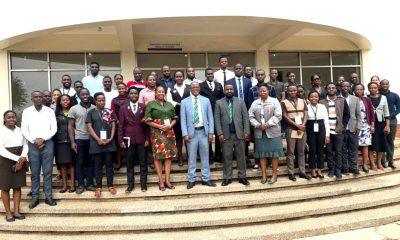

Mak Moves to Revitalize Food Technology & Business Incubation Centre to Drive Innovation & Entrepreneurship
-


Ugandan Study Flags Girls and Senior Students as a Mental Health High-Risk Group
-
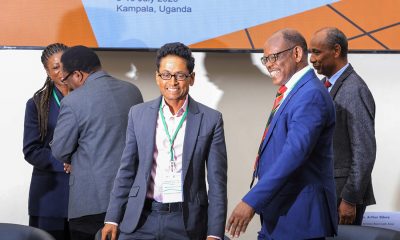

Makerere Hailed for Its Leadership in Health Policy and Knowledge Systems
-
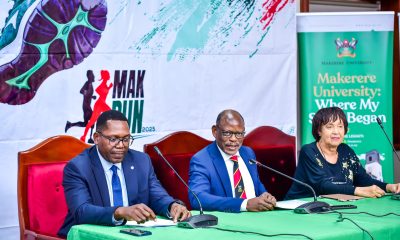

NCBA Commits UGX 1.45 Billion to Makerere Marathon, Pledges Five-Year Support for Inclusive Education
-
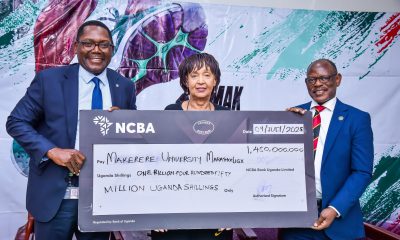

Mak Marathon Unveils NCBA as Platinum Sponsor
-
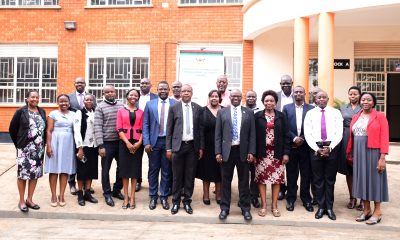

School of Business Conducts Strategic Leadership Training for Makerere University Managers
General
Strengthening Grants Management Through Institutional Collaboration and Capacity Building
Published
4 days agoon
July 15, 2025
As the funding to the higher education sector keeps on reducing due to competing priorities, universities are implored to come up with structures and strategies to attract and win research grants.
Key findings indicate that universities with institutionalized grant management offices, strong and coordinated research teams are better positioned to effectively compete for grants.
Makerere University, in partnership with Northwestern University, is spearheading the E-SMAC G11 Grants Administration and Management workshop from 14th to 17th July 2025, aimed at strengthening grant management offices and systems among the participating universities and entities.
It is envisioned that through this capacity building approach, the workshop which brings onboard over 130 participants from different universities and entities, will address the knowledge and skills gaps among faculty, grant managers, administrators and support staff.
The participating universities and entities include: Makerere University, Uganda Christian University-Mukono, Soroti University, Gulu University, Clarke International University, King Ceasor University, Kyambogo University, Muni University, Mother Kevin University, Uganda Martyrs’ University-Nkozi, Ernest Cook University, Mbarara University of Science and Technology, University of Kisubi, Kabale University, Busitema University, BRAC University, Infectious Diseases Institute, Ministry of Health, and among others.
Makerere University and Northwestern University have built a strong partnership over the past decade through academic exchange, collaborative research, and capacity building initiatives. “Since 2020, the institutions have deepened their collaboration in research administration through the UASP fellowship, sharing best practices and co-developing of sustainable systems to strengthen research management,” said Prof. Sylvia Antonia Nakimera Nannyonga-Tamusuza, Head of Grants Administration and Management Support Unit (GAMSU) at Makerere University.
She informed the participants that Northwestern University has been instrumental in building the capacity of staff at Makerere University in grants writing, management and administration.

Prof. Nannyonga-Tamusuza testified that when she was appointed to head GAMSU, she received comprehensive training from Northwestern University, which enhanced her competences and expertise in the field. She acknowledged Kate Klein from Northwestern University for the mentorship that empowered her with valuable knowledge and skills. She reported that five (5) members of staff from Makerere University had been trained by Northwestern University in grants and research management.
Filled with joy, she introduced the team of experts from Northwestern University namely Kate Klein, Bethany Ekesa and Elizabeth Christian to Makerere University, and applauded them for accepting to be facilitators. Prof. Nannyonga-Tamusuza assured the workshop participants that the team from Northwestern University would not only train them, but would share best practices in grants management and administration as well as networking opportunities.
The training workshop is part of the Expanded Strengthening of Makerere University’s Research Administration Capacity (E-SMAC) program, which focuses on enhancing research administrative systems and staff capacity at Makerere University and its partner institutions. Mordecai Tayebwa is the Program Director and Principal Investigator of the E-SMAC program being implemented from July 2024 to December 2025. The program is funded by the National Institute of Allergy and Infectious Diseases (NIAID).
The workshop provides a platform to build faculty, grant managers and administrators capacity in grant writing and management, foster cross-functional collaboration across departments, strengthen understanding of budget creation, biosketch and funder systems, encourage mentorship and peer to peer learning, and lay a foundation for regular support.
The training tackles four broader themes namely Grants Introduction and Systems, Proposal Development, Capacity Building, and Outcomes and Forward Planning. It covers vital areas such as grant writing, budgeting, funder systems, compliance, and overall grant administration. It features practical sessions, mentorship opportunities, and collaborative learning, with the goal of strengthening pre-award and post-award grant management and improving research productivity and compliance.

Opening the workshop, the Acting Deputy Vice Chancellor (Finance and Administration) at Makerere University, Prof. Winston Tumps Ireeta urged universities to institutionalize grant management offices and policies as well as strengthening research systems through collaborations.
Sharing his experience, Prof. Ireeta informed the participants that he was involved in the strategic discussion that led to the establishment of GAMSU at Makerere University. “We observed that Makerere University School of Public Health had established a grants office, which was instrumental in attracting and winning funds for research. We were inspired by this best practice. Thus, a comprehensive policy was developed to streamline and strengthen grants management across all colleges at the University,” he said.
Prof. Ireeta noted that Makerere University commits to being a research-driven institution, a strategic direction, that needs a strong funding base. ‘Research grants are therefore a key resource,” he said.
Stressing the importance of adhering to the technical details in the grants management processes, Prof. Ireeta appealed to the participants to be active listeners and maximally utilize the moment to learn from the experienced facilitators.

In the same vein, Prof. Nannyonga-Tamusuza, applauded the University Council and Management for the strategic direction undertaken to elevate GAMSU from a Unit to a Directorate. This points to the central role of the grants office in the life cycle of Makerere University. She pointed out that GAMSU reports to the Vice Chancellor through the Deputy Vice Chancellor (Finance and Administration).
Established by the University Council in 2020, GAMSU is a central office at Makerere University. It provides professional and coordinated services across the entire grant life-cycle-from identifying funding and developing proposals to ensuring compliance, project execution, financial oversight, and institutional capacity building. GAMSU works closely with academic and administrative staff to support competitive, well-managed and accountable research.
Focusing on the training workshop, Prof. Nannyonga-Tamusuza called upon the participants to utilize the golden opportunity to deepen their understanding of grants management in advancing research. She acknowledged the role of this collaboration in fostering mutual learning and the sharing of best practices, noting that such initiatives were key in ensuring that research conducted by universities aligns with global standards. She encouraged participants to engage fully in the workshop, collaborate with their peers, and build lasting connections to foster continuous learning.
The Administrative Director of the Havey Institute for Global Health at Northwestern University, Kate Klein, noted that grants administration goes beyond securing funding. She explained that grant administration is about building strong, sustainable systems that support researchers, facilitate collaboration, and ultimately contribute to solving global challenges.
Klein stated that grants administration and management require continuous learning, adaptability, and a strong foundation in regulatory and financial oversight.
“Collaborating and learning from one another is essential,” Klein stated. “When grants administration is effectively managed, it becomes a powerful catalyst for driving impactful change in research, ultimately advancing global initiatives that address the world’s most pressing challenges.”

She urged participants to critically analyze their current systems and identify areas where improvements could be made. By doing so, they would be better positioned to manage grants effectively and maximize their impact. She guided that a research grants administrator should be able to design monitoring frameworks, liaising with funders to address grant-specific issues, coordinating compliance, budgeting and reporting to ensure timely and effective implementation.
Presenting the Existing Support Systems and Principal Investigator (PI) agreements, Prof. Nannyonga-Tamusuza pointed out the critical role of GAMSU in maximizing Makerere University’s access to grants. This is particularly important in the context of limited financial resources, where GAMSU ensures that the university effectively leverages available funding opportunities.
Prof. Nannyonga-Tamusuza explained that GAMSU ensures research projects align with the priorities of funders and comply with both institutional and external regulations. She emphasized that this alignment is essential for securing and managing grants successfully. She stated that oversight offered by GAMSU, helps streamline the process for researchers. She pointed out that grant management is a collaborative process, involving multiple stakeholders across the university, which ensures that the necessary expertise and support are in place to manage grants effectively.
Underscoring the importance of grant negotiations, particularly with sub-award grants, Prof. Nannyonga-Tamusuza clarified that such negotiations are most successful when managed at the institutional level, where GAMSU oversees the entire lifecycle of a grant-from identifying funding opportunities to post-award activities.
Harriet Nambooze, the Project Coordinator at Makerere University School of Health Sciences, provided participants with a detailed guide on navigating the National Institutes of Health (NIH) grant application process. She introduced essential tools such as Grants.gov, eRA Commons, SAM.gov and the NATO Commercial and Government Entity (NCAGE), which are critical for applying and receiving an NIH award.

Nambooze stressed the importance of accurately setting up roles in the eRA Commons system, including Signing Official (SO), Principal Investigator (PI), Account Administrator (AA), and Administrative Official (AO), as well as ensuring that profiles are up-to-date across various systems.
She highlighted the necessity of adhering to NIH’s strict submission deadlines and maintaining active individual and institutional profiles to facilitate timely applications. She recommended that institutions should appoint multiple Signing Officials (SOs), to avoid any delays with the required submissions.
Presenting to the participants, Mordecai Tayebwa shared a detailed, step-by-step guide to starting a new grant application. He explained the key elements of the grant process, including the necessity of including a budget, adhering to specific formatting guidelines, and uploading required documents, such as the foreign justification for international projects.

He pointed out the need of thoroughly verifying the application before submission to ascertain that all required documents are included. “This step is crucial to avoid errors that could delay or jeopardize the submission,” he said.
The first day of the workshop set a strong foundation for enhancing grant administration capacity among the participating universities. Participants were equipped with knowledge and skills in grant systems at the national and global levels.
Day two, will focus on topics such as reading funding opportunity announcements, tailoring writing, budget development and justification, sub-contract management, sub-recipient monitoring, and Memoranda of Understanding (MoUs).
On Day three, the participants will gain a deeper understanding of the Grants Office, financial management, internal controls and reporting, peer review process overview and project closeout.
On Day four, the participants will witness the launch of the MakGAP (Makerere University Grants Professional Initiative), listen to a keynote speech on grants management from the Vice Chancellor of Makerere University, Prof. Barnabas Nawangwe, as well as presentations on professional growth through MakGAP, CRA Exam, and Global Research Administration Networks, and professional recognition of research managers and administrators in Africa and post evaluation.
The first day of the workshop set a strong foundation for enhancing grant administration capacity among the participating universities. Participants were equipped with knowledge and skills in grant systems at the national and global levels.
Day two, will focus on topics such as reading funding opportunity announcements, tailoring writing, budget development and justification, sub-contract management, sub-recipient monitoring, and Memoranda of Understanding (MoUs).
On Day three, the participants will gain a deeper understanding of the Grants Office, financial management, internal controls and reporting, peer review process overview and project closeout.
On Day four, the participants will witness the launch of the MakGAP (Makerere University Grants Professional Initiative), listen to a keynote speech on grants management from the Vice Chancellor of Makerere University, Prof. Barnabas Nawangwe, as well as presentations on professional growth through MakGAP, CRA Exam, and Global Research Administration Networks, and professional recognition of research managers and administrators in Africa and post evaluation.
Health
Ugandan Study Flags Girls and Senior Students as a Mental Health High-Risk Group
Published
7 days agoon
July 12, 2025
Based on research led by Max Bobholz and colleagues from Makerere University in Uganda, Essentia Institute of Rural Health, and the Medical College of Wisconsin in the United States.
Adolescence is meant to be a time of holistic growth and self-discovery, but for many Ugandan teenagers, this period is becoming a season of silent mental health struggles. A new study published in PLOS Global Public Health has uncovered a silent but growing crisis: nearly one in five Ugandan secondary school students in the study areas have signs of an emotional disorder. These conditions included anxiety, depression, post-traumatic stress disorder (PTSD), and adjustment disorders often involving excessive worry, sadness, fear, or mood instability. Also, one in 20 adolescents exhibited behavioral issues ranging from attention-deficit/hyperactivity disorder (ADHD) and oppositional defiant disorder to substance use and other risky behaviors like alcohol use.
The study, led by Max Bobholz, a PhD candidate in Public and Community Health at the Medical College of Wisconsin, surveyed a sample of 1,953 students aged 10 to 18 years enrolled in eight secondary schools in Iganga district in Eastern Uganda and Mukono district in Central Uganda. This was one of the most comprehensive efforts yet to understand the prevalence and drivers of mental health challenges among school-going Ugandan adolescents.
“We are looking at a generation facing a complex blend of stressors, namely, academic, social, and emotional,” says Bobholz. “Our findings show that certain groups are especially vulnerable, and schools need to be equipped to respond.”

This study results, published on June 12, 2025 was funded by the Swedish International Development Cooperation Agency (SIDA), a government agency of the Swedish Ministry for Foreign Affairs, through the Makerere University Postdoctoral Fellowship to one of the investigators, Dr. Catherine Abbo. Other researchers included Julia Dickson-Gomez, Arthur Kiconco, Abdul R. Shour, Simon Kasasa, Laura D. Cassidy, and Ronald Anguzu.
According to the study, girls bear a higher emotional burden. Researchers found that female students had nearly two times higher odds of suffering from emotional disorders such as anxiety or depression than their male peers.
Dr. Catherine Abbo, an Adolescent Psychiatrist and Associate Professor at Makerere University, attributes this to both biological and socio-cultural factors. “Puberty brings hormonal shifts that can heighten emotional sensitivity,” she explains. “But just as importantly, Ugandan girls often face intense pressure to conform to gender roles while also navigating issues like body image, harassment, and future uncertainty.” The researchers are calling for gender-sensitive mental health interventions, particularly in schools, where early support could help mitigate long-term mental health issues.

Higher associations in older teens?
Age also emerged as a key associated factor, with each additional year increasing the odds of behavioral disorders by 20%. “As adolescents grow older, they are more prone to risk-taking, impulsivity, and resistance to authority,” explains Dr. Simon Kasasa, a senior lecturer and biostatistician at Makerere University School of Public Health.

“Combine that with academic pressure and identity-related stress, and it’s no surprise we’re seeing more conduct issues in late adolescence,” Dr. Ronald Anguzu, an Assistant Professor in the Institute for Health and Humanity at the Medical College of Wisconsin, added. This study raises critical questions about whether and how Ugandan secondary schools support older students as they transition toward adulthood.
The unseen influence of family mental health
The study also found that adolescents with a family history of mental illness had twice the odds of exhibiting behavioral problems compared to those without such a history.
“This speaks to the intersection of genetics and environment,” says Bobholz. “Living in a household with people affected by mental illness can mean instability, stigma, and lack of emotional support, all of which weigh heavily on a developing mind.”
The authors recommend that school mental health screening include family mental health history and advocate for greater collaboration between education and health sectors to support at-risk households.

Private schools: High marks, higher stress?
Interestingly, students in private schools had 1.4 times the odds of experiencing emotional disorders compared to those in public schools. Private schools, often seen as academic havens, may inadvertently be cultivating high-pressure environments. “There’s an assumption that better facilities mean better well-being,” says Dr. Abbo. “But intense academic competition, social isolation, and a lack of trained counselors can create emotional pressure cookers.”
Previous research in 47 secondary schools across five districts (Rakai, Kyotera, Masaka, Lwengo, and Kalungu) in southwestern Uganda found that economic and family support helped reduce absenteeism among adolescent girls in secondary schools. However, this support did not significantly improve behavior or reduce grade repetition. The region, which includes districts like Rakai and Masaka, also faces a higher burden of HIV, adding to the challenges young people experience.
Meanwhile, a review of data from 42 primary schools in Luwero District identified school-based mental health interventions such as cognitive behavioral therapy and mindset-building approaches as being particularly effective. Researchers now suggest that integrating these strategies, along with efforts to reduce school violence, could go a long way in improving the mental health of Ugandan adolescents.
A-Level pressure: Academic ambition meets mental health strain
The study also found a correlation between advanced (A’level) education and increased risk of emotional disorders. “We selected one school district from each region based on population and past academic performance. As these students prepare for university or the job market, the pressure to succeed becomes enormous,” says Kasasa. “They’re facing a future full of uncertainty, with very little structured mental health support to help them cope.”

A wake-up call for Uganda’s education and health systems
The authors of this study assert the urgent need for school-based mental health programs, especially in private and A-level institutions. These programs should offer routine screening, emotional support, and training for teachers to recognize warning signs of mental health disorders.
Importantly, this study adds weight to calls for a national adolescent mental health policy, tailored to Uganda’s context, with interventions that bridge health, education, and social services.
“Our data shows that mental health challenges are not a fringe issue,” says Bobholz. “They are widespread, significant, and deeply tied to school, home, and society.”
The COVID-19 school closures between 2020 and 2022 deepened feelings of isolation and financial strain, with out-of-school adolescents reporting depression rates as high as 21.5% to 50% higher than their peers who remained in class, according to research published in February 2025. Yet Uganda invests less than 1% of its health budget in mental health, with just one psychiatrist per million people, leaving many teens to cope through cheap alcohol used by 28% of urban youth or untrained healers, as reported by the government paper The New Vision in April 2025. With only 26% of students completing lower secondary school and 35% of the population under age 24, these mental health challenges now pose a serious threat to the country’s future.
Mercy Akankunda of Proven Foundation, a Ugandan NGO supporting vulnerable groups, warns that mental health struggles are quietly eroding the well-being of the country’s youth, over 12 million strong and making up 35% of the population. “These teens are not just statistics. They are the future of Uganda, she asserts. If Uganda hopes to reap the dividends of its young population, addressing adolescent mental health must become and remain a national priority, not just for treatment, but for prevention, resilience, and hope.
Reference:
Bobholz, M., Dickson-Gomez, J., Abbo, C., Kiconco, A., Shour, A.R., Kasasa, S., Cassidy, L.D., & Anguzu, R. (2025). Correlates of behavioral and emotional disorders among school-going adolescents in Uganda. PLOS Global Public Health. Read the study here
Health
Call for Applications: Responsible Conduct of Research (RCR) Training Course
Published
1 week agoon
July 11, 2025By
Mak Editor
The Responsible Conduct of Research (RCR) Training Course, scheduled to take place from July 30th to August 1st, 2025, at the Makerere University College of Health Sciences’ Conference Room.
Background
The SUSTAIN: Advancing Makerere University Masters of Health Sciences in Bioethics program at Makerere University College of Health Sciences aims at developing and institutionalizing a mentorship program in research ethics that facilitates development of bioethics professionals and health researchers who are committed to the growth and application of research ethics in Uganda’s academic and research institutions to the highest possible degree. The Responsible Conduct of Research (RCR) course is one of the short courses that introduces trainees to a framework that involves application of established scientific, professional norms and ethical principles in the performance of all activities related to scientific research.
Course objectives
At the end of this course, trainees should be able to identify, manage and prevent research misconduct.
Course outline
Introduction to RCR; Introduction to Professionalism and Ethics; Human subject’s protection and regulatory framework in Uganda; Humane handling of animal research subjects; Conflict of interest;
Responsible laboratory practices; Mentor-mentee relationships; Collaborative research international, industry); Peer review; Research misconduct (including policies for handling misconduct); Community involvement during research in a low resource setting; Responsibility to society and environment; Responsible financial management; Data acquisition, management, sharing and ownership; Responsible authorship, publication and communication.
Target group
The Responsible Conduct of Research course is targeted at Researchers, Research administrators, Research assistants, Study coordinators, Graduate students and Student supervisors. Certificates will only be awarded to participants with 80% attendance.
Course fee: 205,000/=, or 56USD is payable.
The course fee will cater for meals and refreshments during the training period.
Payment & Registration procedure:
9030026194023, Stanbic Bank, Mulago, Makerere University Biomedical Research Center Limited
Dollar Currency:
9030026194147, Stanbic Bank, Mulago, Makerere University Biomedical Research Center Limited
Please Note: Share payment details on email/whatsup and a hardcopy deposit slip delivered on the first day of the training to Miriam Musazi, Department of anatomy, Bioethics Centre, Room C4,
Mob: +256 782 363 996/ +256 701 363 996, Email: mmusazi@gmail.com.
NB. Only those who will have paid by this date will be considered for the course
Venue: The training will take place at Makerere University College of Health Sciences’ Conference room
Trending
-

 General2 weeks ago
General2 weeks agoRe-advert: Admission to Undergraduate Programmes 2025/2026
-

 General1 week ago
General1 week agoRe-Advert for Applications for Diploma and Certificate Training
-

 General5 days ago
General5 days agoMakerere University Fees Waiver for 40 First Year Female Students 2025/2026
-

 General2 weeks ago
General2 weeks agoPress Statement on Ranking
-

 Health1 week ago
Health1 week agoCall for Applications: Responsible Conduct of Research (RCR) Training Course
